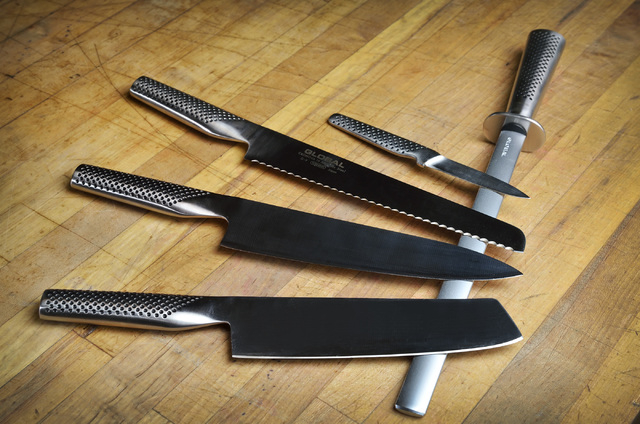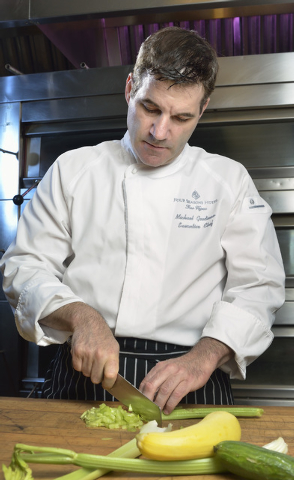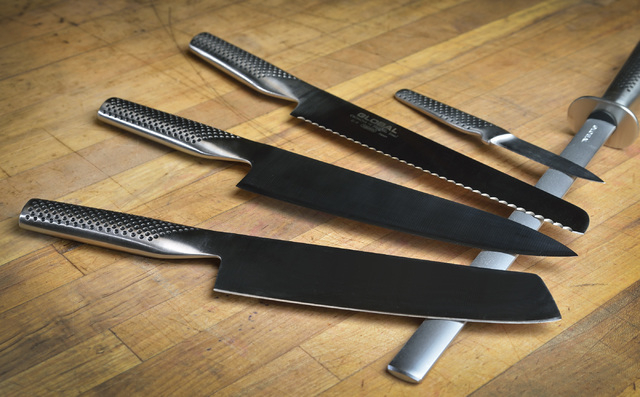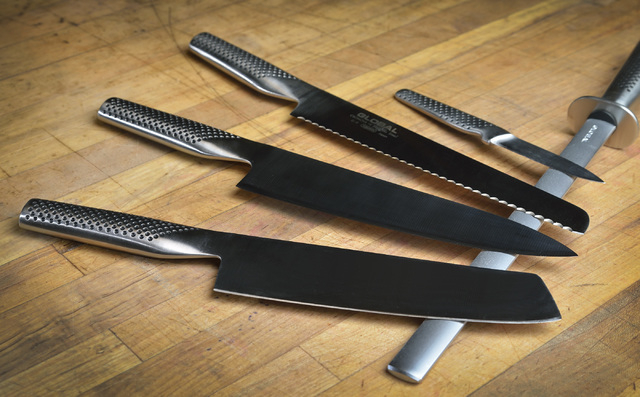Well-maintained knives essential tools for cooks and chefs







Hang around a restaurant at opening or closing time and you’ll likely see a cook or two toting a case carrying the most important tools of the trade.
“Knives are everything to a chef,” said Michael Goodman, executive chef of the Four Seasons. “Without a knife, we’re not doing anything.”
“They’re like my passion,” said Luigi Iannuario, executive chef of Hank’s Fine Steaks at Green Valley Ranch Resort.
So it would follow that even if you’re not a professional culinarian, taking care of your knives would serve you well in the kitchen.
“Care and maintenance is a big, broad subject, because the knives are made in so many ways,” said Peter Wagner, “the boss” at Knives and More, a local shop.
But Wagner, who said he has 30 years in the business, does offer some advice, starting with:
“If you want the knife to cut 10 years down the road the way it cuts today, don’t use it.”
OK, rim shot there, but Wagner has some serious tips, too, and they’re all don’ts.
Don’t store knives in a drawer, unless you have blade covers.
If you store them in a knife block, don’t put them in with the blade facing into the slot, put them in with the knife’s spine facing the slot.
Don’t use hard synthetic cutting boards like Corian, because you’ll chip your knife blades. It’s OK to use softer synthetic boards, like acrylic.
Don’t put your knives in the dishwasher, because the phosphates and the heat will ruin the blades. Wash them with liquid soap and the soft side of a sponge and towel dry — “carefully, so you don’t cut yourself.”
Don’t use any “hand gadgets” or electric knife sharpeners to sharpen them.
“When I personally sharpen my knives, I use good old-fashioned flat stones,” he said.
“There are some crazy products out there right now,” Goodman said. “I don’t recommend them.”
Considering that good knives cost $100 or more, you shouldn’t even consider using such a gadget, Wagner said. Learn to do it by hand or have your knives professionally sharpened, at $3 to $5 each.
Although Knives and More does provide a sharpening service, Wagner has created instructional videos for do-it-yourselfers who want to learn. Go to Youtube.com, type MREZCooking in the search bar, and you’ll find a series of them.
Alan Warrenski, branch manager of Standard Restaurant Supply, said the main thing he thinks people need to know about knives is that some are made of a harder steel and some are made of a softer steel.
“The reason chefs use the softer steel is they can keep putting an edge on it,” he said.
Recent graduates, he said, like to use harder steel, which keeps its edge longer.
The problem: “Once that edge is off, you can never get it really sharpened the way you want it,” he said.
Warrenski said every knife manufacturer makes both types, and the softer steel usually is a little less expensive.
Wagner added that his videos also cover sharpening steels, or rods.
“People think they sharpen, and they don’t,” he said, and Warrenski concurred.
“If you took a knife and looked under the microscope, it gets a little edge that starts to flip out,” Warrenski said. “When they do that steel, it pushes the knife back into shape.”
“The steel is to kind of ‘tweak’ it, if you will,” Goodman said. “It keeps the edge on it, but it doesn’t really sharpen it.”
A flat, three-part sharpening stone and honing oil are used for actual sharpening.
Wagner said Japanese knives are the hottest thing today.
“They’re finding out that they’re thinner, lighter, faster and better-cutting than their European counterparts,” he said. “They’re thinner, and so they make a finer, more delicate cut.” European knives, he said, are “built technically as a wedge, so they have drag. The Japanese knives don’t suffer from drag.”
While, he said, custom Japanese knives can cost thousands of dollars, Japanese and European knives usually are comparably priced, at about $130 for an 8-inch French knife.
Goodman said while he used to use European knives, his current favorite is Japanese, a Global chef knife, or French knife.
“It’s usually an all-purpose knife, for dicing, julienne — that kind of stuff,” he said. “A paring knife is smaller, for doing small tasks. Fish knives and a boning knife are for breaking down meat and fish.”
Iannuario said his favorite is a boning knife, “the ones that require more precision, when you bone meat or fish. You’ve got to be very precise with it.
“German knives I like for vegetables. I like my Japanese knives for seafood. The German knives are more solid, and vegetables require a little more power. The Japanese are more precise and more delicate; they’re usually thinner. It doesn’t damage the fish when you cut it thinner, it goes through the flesh better.”
A home cook selecting a knife should try it out, Goodman said.
“Obviously, you want a knife that you feel comfortable with, depending on the job that you’re doing,” he said. “Making sure you have the right knife for the right task is very important.”
Some knives come in various sizes, so you should find one that fits your hand. Chef’s knives, Goodman said, generally come in 6-, 8-, 10- and 12-inch lengths.
“I feel comfortable using a little smaller knife,” he said, and uses an 8-inch and a 10-inch.
Iannuario said he uses a steel on his knives after every use, and sharpens them with a stone daily.
And that, Goodman said, is very important.
“Make sure that your knife is very sharp at all times,” he said. “A dull knife will cut you.”
Knives hold special places in the memories of both chefs.
“I’ve been handling them for a very long time, since I was a kid, 11 years old,” Iannuario said. “The first thing that my grandma taught me was using a knife.”
Goodman said he still has the first knife that was given to him, by his grandparents.
“It’s really sentimental,” he said. “Through all of the knives that I have, I can look at them and say when I got them and where I got them.
“It’s our livelihood. … I can’t say how sentimental they are to a chef. They’re our world.”
Contact reporter Heidi Knapp Rinella at hrinella@reviewjournal.com or 702-383-0474.


















